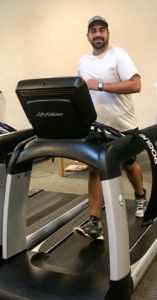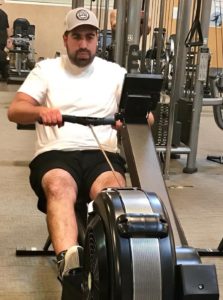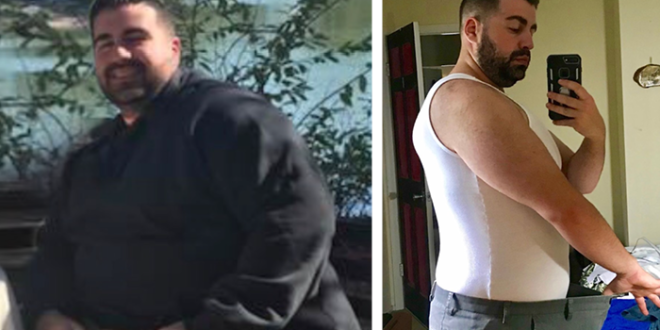by Michelle Sutton-Kerchner
Ten years ago, Joe Cerillo was in a car accident. His life as a strong, confident high school athlete ended. A decade later, at 350 pounds, Joe needed to make serious changes …
The Aftermath of a Tragedy
The trauma of Joe’s auto accident triggered panic disorder. This condition causes sudden attacks of fear, which may manifest in physical symptoms that often resemble a heart attack. The dread of these attacks can cause other fears, including the inability to leave one’s house. Joe suffered this fate for several months as a “prisoner” in his home.
Eventually, Joe developed the courage to leave the confines of his residence. However, medications and a sedentary lifestyle led to extreme weight gain for this former football player. This combined with the stress of meeting quotas in a car sales job. Joe’s overall health continued to suffer.

“I needed a big change. I quit my sales job and became a grocery store manager. I traded stuffed-shell dinners for brown-rice stuffed peppers,” comments Joe. My motto became, “Move more. Eat less.” These actions motivated more improvements.
With ten years of learned coping mechanisms, Joe was able to venture further beyond his house without suffering a panic attack. Currently, he can travel within an hour’s distance before heart racing, sweats, chest pain, and other symptoms occur. For Joe, these symptoms also include feeling “pins and needles” in his extremities. To help the panic disorder, his physician advised exercise for its release of endorphins.
After trying all area gyms, Joe joined the Center. Here, he knew he could achieve his ultimate mental and physical health goals.
Joe’s Accomplishments
It has been one year since Joe became a Center member. His progress has been amazing. Joe has not experienced a panic attack since beginning his exercise regimen. He breathes better, feels more in control, and focuses better. These skills help counter panic attacks where a person feels out of control, breathless, weakened, and flooded with fear.
“I feel stronger and healthier. Exercise gives me a huge confidence boost to handle whatever life throws my way,” Joe asserts.
Joe’s Advice

Whether striving to lose weight, overcome a health issue, or simply live better, Joe emphasizes the need for preparation. “If you prepare to be successful, you do not have any other choice than to succeed,” he says emphatically. At the start of every week, Joe plans his workouts and meals. Once the routine is set, he does not deviate from it—even when he works that 60-hour week.
“It’s hard to stray from your goals when everything is planned in advance. To keep on track with a healthy lifestyle, you must remain organized. You cannot leave anything to chance.”
The Reality of Mental Health
Approximately 30 percent of adults in the United States experience an anxiety disorder, including panic disorder, during their lives. The majority experience some degree of impairment from it. A slightly higher number of adolescents (ages 13 to 18 years) experience an anxiety disorder.
The Benefits of Exercise
A regular fitness routine is often “prescribed” to improve mental health, whether dealing with a stressful day or chronic condition. For anxiety and panic disorder, it helps by decreasing sensitivity to the body’s reaction to emotions involved. Elevated heart rate, blood pressure, and other automatic anxiety responses are not as intense and don’t last as long. As a result, they are less likely to develop into a full-blown panic attack.

Aerobic exercise actually builds the body’s tolerance to stress. Vigorous workouts create better-nourished brain cells, strengthened to prevent harm when exposed to stressful situations. This includes those induced by anxiety. Plus, there isn’t anything like a good kickboxing class to relieve stress-produced tension and excess energy.
Becoming physically stronger helps instill confidence in your health and ability to overcome challenges. Joe noted this positive side-effect of his fitness endeavors. “I’m stronger, more capable, and not in the same place I was,” he proudly shares, along with being almost 100 pounds lighter. Weight has been lifted, both physically and mentally.
If you are suffering from a mental health issue, be brave. Take control and seek help. Joe did. And, his success is apparent in every pound lost and mile of travel-distance gained.
Sources
National Institute of Mental Health at www.nimh.nih.gov
“Stop Stress for Good: Exercise to Fight Stress,” by Kimberly Goad at fitnessmagazine.com.
 Fitness & Wellness News Your Source for Fitness News, Wellness News, Health News, and Nutrition News!
Fitness & Wellness News Your Source for Fitness News, Wellness News, Health News, and Nutrition News!




